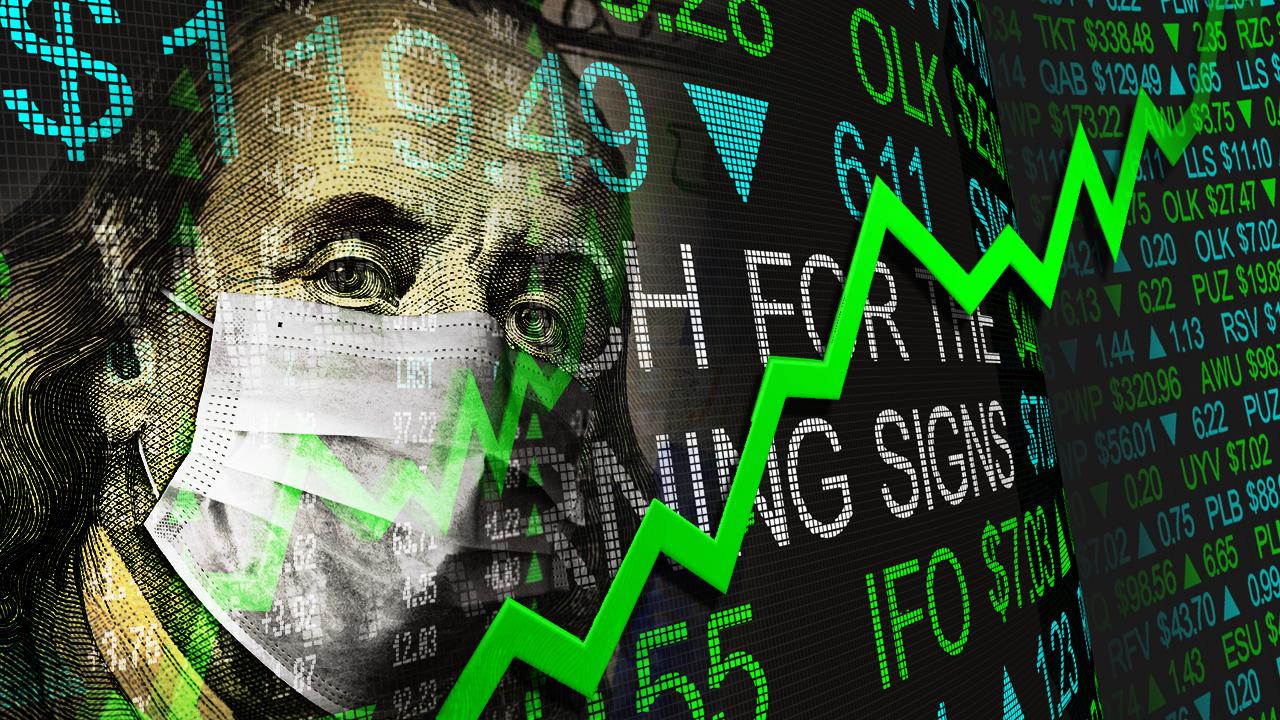How will double-digit unemployment affect your stock portfolio?
If you think things will just snap back to normal after the second quarter, think again
Get all the latest news on coronavirus and more delivered daily to your inbox. Sign up here.
We've all seen the numbers -- more than 30 million people have filed for unemployment so far during the coronavirus pandemic, and this is certain to cause the near record-low unemployment numbers we've seen recently to rocket higher.
Well, that's exactly what is expected to happen, according to the nonpartisan Congressional Budget Office (CBO):
Perhaps the most alarming statistic to long-term investors is that the CBO expects unemployment to remain elevated at a 10.1% level through 2021 and only decline to 9.5% by the end of 2021.
STOCK MARKET LOOKS BEYOND CORONAVIRUS
If you think things will just snap back to normal after the second quarter, think again. Here's how the latest unemployment projections could affect your stock portfolio.

(iStock)
Why is unemployment expected to remain so high?
It may seem counterintuitive for the unemployment rate to remain depressed until the end of 2021. After all, the economy is already starting to reopen, so it might seem like the unemployment rate should snap back to its pre-COVID levels quickly.
The short answer is that while the economy will likely reopen before 2021, demand isn't expected to immediately return to pre-COVID levels. Millions of Americans (especially those in the higher-risk segments of the population) will be extremely hesitant to travel, shop, dine in restaurants, and engage in other social activities until there's a readily available vaccine. Many more will simply choose to remain largely socially distant.
3.17 MILLION AMERICANS APPLIED FOR UNEMPLOYMENT LAST WEEK, ADDING TO WAVE OF CORONAVIRUS LAYOFFS
Some of the unemployment numbers we've seen have been attributable to furloughs, meaning that the employers are planning to bring these workers back once it's safe to do so. On the other hand, there have also been millions of layoffs, and while some of these workers will certainly be rehired upon businesses reopening, it's not going to be anywhere near 100%. Some businesses will unfortunately shut their doors for good, and others simply won't need their full workforce right away.
Consider this simplified example. Let's say that you run a restaurant and had 30 employees before you were forced to close your dining room. You retained five of them to provide takeout services and laid off the rest. Once you are allowed to reopen your dining room, your state's governor limits indoor dining to 25% of capacity in order to maintain social distancing. Are you going to hire back all 25 of the employees you were forced to lay off? Probably not, at least right away.
In a nutshell, while businesses may reopen within the next few months, staffing levels are going to gradually return to pre-crisis levels over an extended period of time.
Double-digit unemployment? Why is the stock market rallying?
Since bottoming on March 23, the S&P 500 index has rallied by nearly 30%. To be sure, it's still roughly 15% down from its pre-crash highs, but this is a big upward swing, especially considering the grim unemployment projections.
The short explanation of why the market has rocketed higher over the past six weeks is that quite a bit has happened since the March 23 lows that has changed the expectations. We covered much of this in a recent article, but to run down some of the highlights:
- Congress passed a massive stimulus bill for large corporations, small businesses, and individuals.
- For now, coronavirus cases appear to have peaked or plateaued in most of the nation -- assuming that reopenings don't lead to another surge in infections.
- While we still don't have a cure or vaccine, clinical trials revealed that Gilead Sciences' (NASDAQ:GILD) remdesivir improved recovery times among severely ill COVID-19 patients. The drug has since received emergency-use authorization from the FDA.
- The Federal Reserve slashed interest rates to zero, and it announced an unlimited quantitative easing program as well as a $600 billion "Main Street" business lending program.
If these four things didn't happen, I think we can all agree that the unemployment projections would be much worse.
How does unemployment affect the stock market?
It's difficult to quantify the effects of unemployment on the stock market, as economic growth and employment are two different concepts. Having said that, an elevated unemployment rate could certainly affect the stocks you own.
STATES DEPLETING UNEMPLOYMENT FUNDS AS CORONAVIRUS CAUSES MASSIVE SURGE IN JOBLESS CLAIMS
Think of it this way -- the vast majority of Americans rely on their paychecks to support their lifestyle. The more people who are unemployed, the fewer people that are able to spend money. And the ability of Americans to spend money is a major factor in corporate earnings, and therefore stock prices. Sure, unemployment benefits help, but they typically aren't comparable to one's income from a job. And the current $600-per-week increase in unemployment benefits is scheduled to disappear after July.
What sectors could be affected most?
While elevated unemployment is likely to influence stocks, some sectors are likely to be affected more than others.
The financial sector is one big example. For one thing, the CBO projections call for interest rates to stay near record lows for the foreseeable future, with a 10-year Treasury yield of just 0.7% in 2021 -- compared to 3.2% in November 2018, and 1.9% at the end of last year. Banks profit by loaning money and collecting interest, and low rates could squeeze their profit margins.
More importantly, elevated unemployment could also lead to a steady wave of loan defaults, which could lead to billions in losses for banks until the economy normalizes. For example, in its recent earnings report, JPMorgan Chase (NYSE:JPM) announced that it had added $6.8 billion to its loan loss reserves in anticipation of a wave of defaults. Bank of America (NYSE:BAC) set aside $4.8 billion for the same purpose, and virtually every other U.S. banking institution has braced for losses as well.
Consumer discretionary stocks are another sector that could be affected. Companies that sell things that people want (as opposed to things they need) tend to be more sensitive to adverse economic conditions.
As a result of the financial crisis, the U.S. unemployment rate spiked from less than 5% at the beginning of 2008 to 9.9% at the end of 2009. Ford (NYSE:F) saw TTM revenue decline by 33% during this period as consumers decided to buy fewer new cars. Tiffany & Co's (NYSE:TIF) sales declined by 13% as consumers were hesitant to splurge on luxury purchases.
On the other hand, Procter & Gamble (NYSE:PG), which mostly sells things people need saw sales hold up much better, with a decline of just 3% in that time period. And Walmart (NYSE:WMT) actually saw revenue increase by 7% -- not only do they sell essentials, but they do so for less than most competitors.
Which stocks should be OK if unemployment stays high?
On the other hand, some parts of the stock market should be less affected by high unemployment. I already mentioned consumer staples (companies that make products people need) and non-discretionary and discount-oriented retailers.
Utilities are another good example. Companies like Duke Energy (NYSE:DUK) and Consolidated Edison (NYSE:ED) tend to maintain their revenue streams during difficult times. After all, when people need to cut back, paying their electric bills typically aren't on the chopping block. Telecommunications companies like Verizon (NYSE:V) and AT&T (NYSE:T) should also hold up well, as their core revenue drivers are mobile data subscribers, and people generally continue to pay their phone bills during tough times.
What should investors do?
One key point that investors need to keep in mind is that these are just projections. Although we've learned far more about the novel coronavirus than we knew a few months ago, there's a lot we don't know. Nobody can tell us for sure when the pandemic will end, whether a second or third wave of infections will come, or what each individual state will do with the timetable of reopening their economies.
GET FOX BUSINESS ON THE GO BY CLICKING HERE
The CBO unemployment projections included assumptions of social distancing continuing through June and diminishing after, and included the possibility of a resurgence of infections. Depending on how the situation plays out, the actual unemployment figures (especially as far out as 2021) could be significantly higher or lower.
The best course of action for investors is to focus on quality. Buying the stocks of well-run businesses with solid balance sheets is always a great long-term strategy, and this is especially true in uncertain times. Warren Buffett says that "all there is to investing is picking good stocks at good times and staying with them as long as they remain good companies." And now is the time to really put those words into action.
CLICK HERE TO READ MORE ON FOX BUSINESS




















